#Musakhan recipe
Explore tagged Tumblr posts
Text
Mussakhan (The national dish of Palestine)
Oven roasted chicken with lots of onion and olive oil, served on a bed of flatbread. This recipe is a sure crowd pleaser, that's not only pleasing to the eye but a treat for the tastebuds as well.
Oven roasted chicken with lots of onion and olive oil, served on a bed of flatbread. This recipe is a sure crowd pleaser, that’s not only pleasing to the eye but a treat for the tastebuds as well. I first made Mussakhan on my birthday a few months ago as a part of the Palestinian menu that I put together for my friends. Palestinian cuisine has always fascinated me, but when things got ugly in…
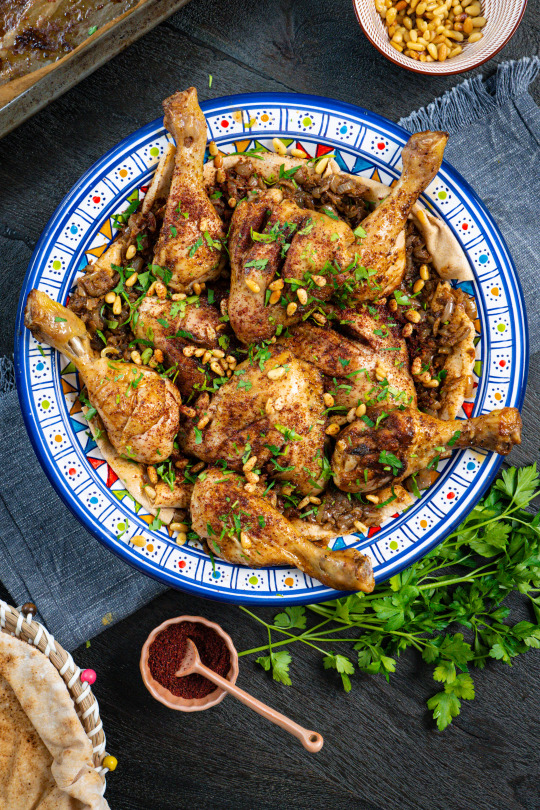
View On WordPress
#Arabic recipe#Middle eastern recipe#Musakhan recipe#Mussakhan#Mussakhan recipe#Palestinian cuisine#Palestinian food#Palestinian recipe
6 notes
·
View notes
Text

Traditional Palestinian Musakhan
#food#recipe#dinner#musakhan#chicken#onions#pine nuts#sumac#chick pea#garlic#naan#flatbread#palestinian#dairy free#baking
85 notes
·
View notes
Text
Love when people making recipes have a very different definition of simple/easy.
You, a professional, may find it easy, but you straight up told me to cut up 6 onions. This is no longer easy and is now a trial of wits.
#mawcie.txt#I am very slow when chopping veggies. 6 onions will take me an hour#Recipe was for Palestinian musakhan wraps btw!#Looks good as fuck but I don't have most of the ingredients :{
1 note
·
View note
Text
Zionists who talk shit about how they “provide” water and electricity to “ungrateful” people in Gaza never cease to amaze me. Brother that’s just an admission of the occupation. Israel has ownership of their resources. Israel has the power to shut off all life sustaining functions in Gaza. They have literally been doing so for two and a half months. Palestinians are dying of starvation, thirst, disease, and all around unlivable conditions because Israel has the power to shut down water, shut down electricity, shut down the entire medical system, shut down the passage of aid into the strip, shut down telecommunications, shut down all of daily life. Somewhere around 1 in 100 people living in the Gaza Strip prior to October 7th are dead. Even after a ceasefire, people are going to continue dying because of the destroyed infrastructure and because of perfectly treatable injuries that won’t be attended to in time or with the resources necessary. Israel doesn’t “provide” resources to Palestine. No colonial settler state “provides” anything to the indigenous populations it commits genocide against. It deprives them because that is what is necessary to maintain the colonial settler state.
Anyway, what annoyed me just now in the first place was seeing the comment section of a musakhan recipe where some smug zionist said, “cooked on electric or gas stovetop with energy provided by Israel!” Aside from the obvious assholery, it made me fume because Israel isn’t fucking providing energy to Gaza right now. This is exactly why Israel has control of the energy resources to begin with, so that they can enact this kind of collective punishment on the people of Gaza. What kind of cruel, ignorant cunt do you have to be to tout the state of Israel’s “generosity” right now?
Anyway, here’s the response from the person who filmed the musakhan video (chefjjskitchen on instagram) to that Zionist:
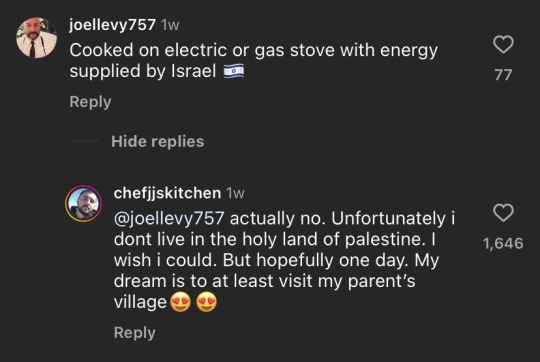
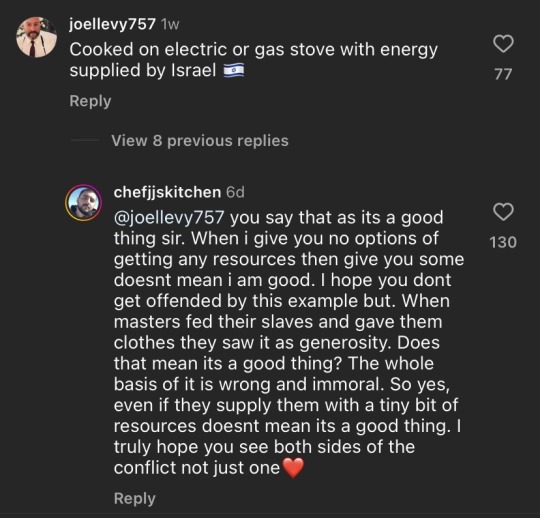
Alt text: an interaction in instagram reels comment section. joellevy757 says, “Cooked on electric or gas stove with energy supplied by Israel (Israeli flag emoji)”
chefjjskitchen, the user who posted the reel, responds, “actually no. Unfortunately i don’t live in the holy land of palestine. I wish i could. But hopefully one day. My dream is to at least visit my parent’s village (heart eyes emojis)”
chefjjskitchen continues, “you say that as its a good thing sir. When i give you no options of getting any resources then give you some doesnt mean i am good. I hope you dont get offended by this example but. When masters fed their slaves and gave them clothes they saw it as generosity. Does that mean its a good thing? The whole basis of it is wrong and immoral. So yes, even if they supply them with a tiny bit of resources doesnt mean it’s a good thing. I truly hope you see both sides of the conflict not just one (red heart emoji)”
End alt text
504 notes
·
View notes
Text

just made this recipe, which is a wonderful take on the traditional palestinian dish musakhan. if anyone is looking for a simple yet delicious palestine dish to make during the strike, i would 100% recommend this! 💕
#im planning to make more palestine dishes in the upcoming weeks!!#free palestine#free gaza#gaza strip#gaza genocide#from the river to the sea palestine will be free#palestine#palestine recipes#recipe#food#palestine food
259 notes
·
View notes
Text
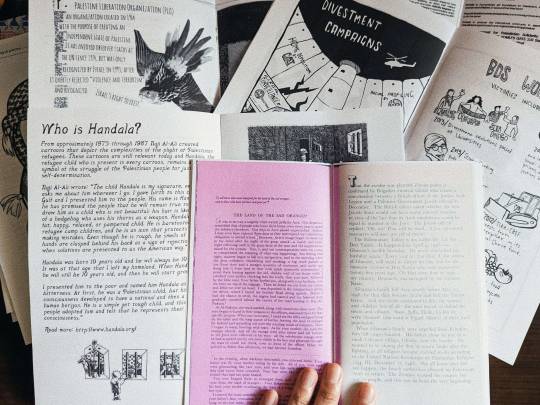
A couple weeks ago, I led a zine making workshop/Palestinian solidarity event for my local Asian racial solidarity group. I gave a primer on zines and DIY as well as the political roots of DIY publishing, and some tutorials. The theme was reconnecting to resistance in an open learning circle since the Asian continent has a long and wide breadth history of resistance. We provided zine making supplies and I brought both some Palestinian zines and a curated collection of examples from my personal zine library! It was also potluck style.
It was kind of interesting leading this workshop! I don't consider myself to be an expert on revolutionary histories, there's a lot of theory and info to catch up on, but I read a lot of PFLP and Palestinian resistance writing when I was in my undergrad because I was able to meet Joe Sacco who was the cartoonist who published Footnotes in Gaza and Palestine (around 2017?). I also designed some posters for his Toronto visit in partnership with the TPFF. Most significantly, I read Strategy for the Liberation of Palestine by the PFLP - it is both a historical document and a live program that lays out the fundamentals of Palestinian liberation as well as localized analysis (160~ pages). There were Asian people in attendance originating from all over the continent and of varying faiths but no one was familiar with historic Palestinian resistance, only with the current narrative about israhelli occupation - so of course I was happy to to talk about Ghassan Kanafani, Leila Khaled, and the PFLP and the historic 3rd world solidarity movements across Asia!
Most people weren't familiar with zines either, so I was also very sparkly-eyed in info dumping about zines to the room! One of the participants brought musakhan rolls which are a traditional Palestinian dish... they were SO yummy... I did have more than I should have... and they included the recipe as one of the zine pages!!! There were also many Filipinos present resulting in me going home with a lot of leftover turon (it helped me survive my ongoing depressive episode in April lol)
Overall it was so nice having conversations with others regardless of where they were at in their politicization journey. There is always more to learn, and more time to spend with one another...and we can all grow together too 🫶🏼 politicization can be very personal and I think as long as we can develop principles, sense for collective, and maintain revolutionary imagination - we can survive together!
Here are some of the Palestinian zines that I brought for people to sift through! I have like 20+ pdfs on my computer and more from encampments that I've visited and will hopefully scan soon!
Palestine: An Introduction from DecolonizePalestine ABCs of Occupation & Resistance by Rachel Mattson The Palestinian Struggle for National Liberation by OBF-HRD/Manila University BDS: What it is, Why it matters by Leila Abdula Razzaq Digitized copy of Ghassan Kanafani by Anni Kanafani (Beirut, 1973), found via the internet archive! From Galilee to Gaza, A voice from Palestine from CrimetheInc. Handala and Other Symbols of Palestinian Resistance & Revolution by...me! (I'll add a link later)
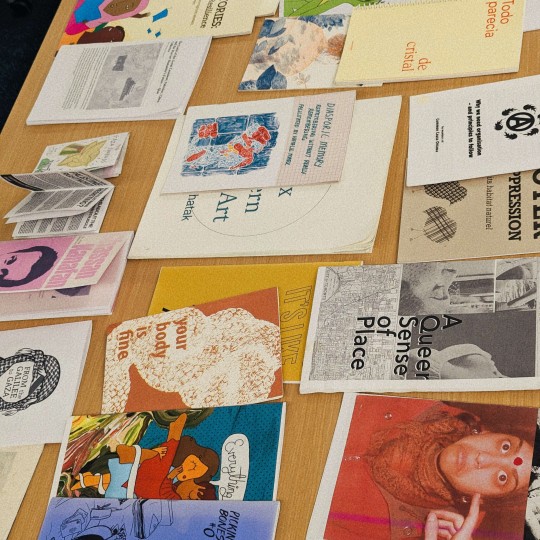
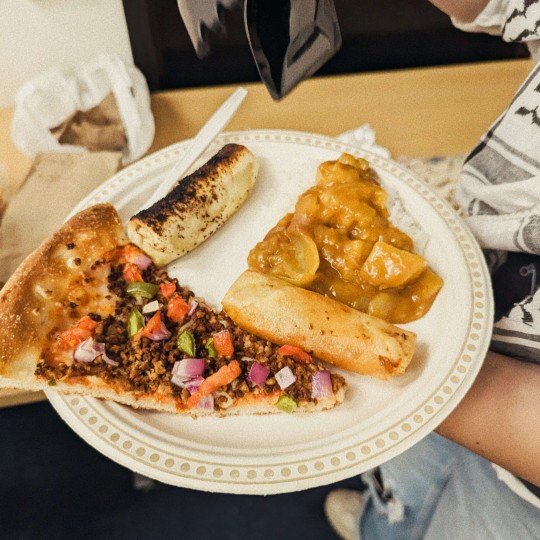
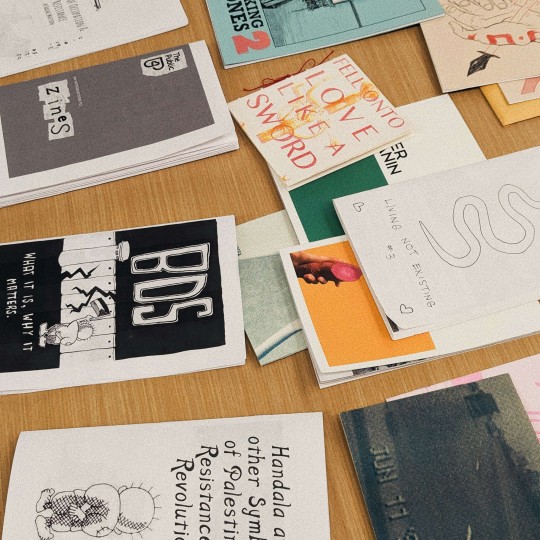
#trying to blog here more so it's not months between art posts hiii#blog#zines#culture work is also so important!
37 notes
·
View notes
Text
Musakhan: A beautiful and delicious Palestinian dish. 😋 This video delivers not only a recipe but an important message!
#free gaza#free palestine#gaza#palestine#from the river to the sea palestine will be free#pray for palestine#usa#america#united states#cooking#home cooking#chef#recipies#recipe#cultural food#culture#message#food#foodie#food to try#tasty#palestinian culture
115 notes
·
View notes
Text
I think that the current trope that is going around of "Jews steal food (recipes)" is absoltely bonkers.
Like don't get me wrong, food can be colonized. Like do y'all remember that viral recipe that went around last year where a white women called Oi Kimchi "spicy pickled cucumbers" and that she invented it when it was actually invented in Korea before her grandparents were even a thought?
That is an example of food colonization/stealing recipes.
What is not food colonization or stealing recipes is jews consuming food that is also eaten in palestine.
There are 3 foods which I hear this about the most. Falafel, Shashuka and Donar Kebabs. The thing is, none of those dishes are uniquely Palestinian.
Most theories place Falafel as originating in Egypt. Donor Kebabs comes from Bursa (modern day city in Turkye) under Ottoman rule Shashuka comes from Tusnia.
None of those countries are Palestine.
Below are two less common foods that Israeli chefs get accused of stealing recipes from Palestine for making or using.
Hummus - First recorded in Syria Sumac - Native to Iran but used in the middle east and northern africa.
If other arab countries can cook food and use ingrediants from other arab countries, why are Israeli's and Jews not allowed to?
Southern Levant was occupied by Jewish nations from 1047 BC until 587 BC. No one singular Jewish nation occipied the whole of Southern Levant for the entirety of that as at one point there were multiple Jewish nations in Southern Levant. However for that time period, either one or more Jewish nations occupied the land. Do you expect that jews never used the native flora and fauna in their cooking?
Another thing is that arab jews exist. They have brought their cusine to Israel as well. Are Iranian Jews who are ethnically Iranian from Iran stealing recipes from Iran?
If Palestinians can lay claim to those foods being Palestinian cusine instead of the countries of their respective origins, why can't Israel?
The matter of the fact is, by anti-zionists defitions of stealing food/recipes, most arab countries have stolen food from other countries. Most countries across the globe have done that.
The idea that Israel is the only country in the middle east which steals food and recipes, is antisemetic. Either all countries in Levant can lay claim to recipes orignates in the Levant region, or only the countries where food originated from can lay claim. There cannot be an execption for only jews.
Claiming that jews cannot make certain food was a tactic used in our oppression. Thats how bagels exist. In Poland, for a period of time jews were not allowed to bake raw bread as it was seen as appropriating Christianity and Jews baking bread was unholy. Bagels were boiled first and then baked to get around that.
It is bonkers that we are starting to see old antisemetic tactics starting to resurface and become popularized
Ps: If you want to make a recipe that originated in Palestine, I reccomend Musakhan as it is very delicious. Recipe from a Palestinian cook here
55 notes
·
View notes
Text
Ahla wa sahla (welcome) to our Palestinian kitchen! We are Ahmed and Bianca, a mixed culture couple living in the beautiful city of Nablus in Northern Palestine. Join us for a 1-hour virtual cooking class over Zoom featuring Palestinian classics like maqlouba, oozie, musakhan, awameh, qatayef, and more. The class will be led by an experienced female Palestinian chef who will walk you through each step of the recipe. All instruction will be translated from Arabic to English. Class sizes will be small; no more than 4-5 people per class. If you're also learning Arabic, this is a fantastic opportunity to practice! Please note that all dishes can be adapted to a vegetarian or vegan diet. Before each class, we will send you a detailed ingredient list so that you are prepared. All ingredients can easily be found in your local markets or grocery stores. Classes are held each Sunday @ 1pm EST/7pm CET OR 2:30pm EST/8:30pm CET. Each class is $30 USD. [A bundle of 4 classes is $100 USD] The first class will be held Sept. 29th, 2024
3 notes
·
View notes
Link
4 notes
·
View notes
Text

Chicken Musakhan
#food#recipe#dinner#musakhan#chicken#onions#flatbread#sumac#almond#pine nuts#lemon#cinnamon#palestinian
50 notes
·
View notes
Text
Erik listened to Dina's recounting of her encounter with the Avengers. "Language," he chuckled, "but truth be told, I'm not particularly fond of them either," he admitted, a wry smile on his lips. "Though I suppose it’s good to know they have decent taste in food."
He leaned in slightly, genuinely interested in her favorites. "Qidreh and musakhan sound delicious. I've always appreciated a well-cooked meat dish. We'll have to order some of those tonight and see how they compare to your family's recipes."
Erik took a moment to absorb the warm ambiance of the restaurant, feeling a sense of connection not just with Dina but also with the culture and traditions she spoke of so fondly.
He picked up the menu, his eyes scanning the handwritten descriptions. "You know, I grew up in Poland, and while the food there is very different, I always felt a strong connection to the meals my family made. It's amazing how food can bring back memories and make you feel closer to those you love."
He signaled the waiter, ready to order. "Shall we start with your favorites, then? Qidreh, musakhan, and maybe some shawarma to share? And if there's anything else you want to try, just let me know."
@weebwholovesuchihasasuke
@weebwholovesuchihasasuke Because you Like/Reblogged
Magneto stands at the edge of the training grounds, his imposing figure casting a long shadow. The air hums with a quiet intensity as he watches Dina practice, his expression unreadable. With a deep breath, he steps forward, his cape billowing slightly in the breeze.
"Dina," he calls out, his voice firm yet gentle.
As she turns to face him, he approaches with measured steps, his eyes studying their face closely. "I am Magneto," he begins, his tone carrying the weight of his name. "I've come to speak with you about something of great importance."
He pauses, searching for the right words. "I know this may come as a shock, but I am your father. I have watched you from afar, knowing that one day this moment would come."
Magneto's gaze softens, a rare vulnerability showing through. "I understand if you have questions, or if you feel anger or confusion. But know that I am here now, and I want to be a part of your life, to help you understand your abilities and your heritage."
He extends a hand, a tentative yet hopeful gesture. "Will you allow me the chance to explain, to show you the truth of who we are?"
55 notes
·
View notes
Text
The World's Most Famous Foods
I would say Ramen if you asked me. I've tried wide different varieties because I adore them. One of my favorite foods; you should try it if you haven't already. There are so many variations of Ramen that it is impossible to list them all.
If you're unfamiliar, dim sum is a Chinese food that translates to "touch the heart." This particular savory snack is frequently provided with tea. Numerous varieties of dumplings, noodle rolls, and other foods are available.
You can eat dim sum, either steamed or fried. With each dish, a different filling is used. For instance, the har gow, a traditional Cantonese dim sum, comprises chopped shrimp wrapped in thin skin. Soy sauce is usually served with this. The siu mai, a pork and shrimp dumpling is another well-liked dim sum dish. Among the fillings in this dish are ground pork, green onions, and mushrooms.
A kebab is a meat dish typically served on skewers in Turkey. Kebabs come in various varieties and can be eaten with various toppings. The meat is generally stewed with tomato and onion. Different types of vegetables are also used, though.
Popular Turkish street food is doner kebab. It is made of doner meat that has been thinly sliced and cooked on a vertical rotating spit. The heart is then grilled, and various toppings are added. The doner kebab can be consumed as a sandwich or traditionally served on pita bread.
Greek casserole called moussaka is made with meat and eggplant. It is a well-known Turkish and Balkan recipe. Although its origins are unknown, it is most likely from the Middle East or one of the Arabic nations. Moussaka can be made in various ways, but it's most frequently made as a layered baked dish. There are typically three layers.
Typically, eggplant fills the bottom layer of the casserole. A thick bechamel sauce is placed on top of the baked good. Additionally, some variations contain potatoes and zucchini. "moussaka" was initially used to describe a dish made with thinly sliced eggplant. This dish is also known as musakhan, musakhkhan, or makhana.
One of the most consumed foods worldwide is Ramen. This soup's origins date back hundreds of years to China. It was introduced to Japan, where it is now well-known. A variety of noodles and flavored broth are used to make the dish. The soup is topped with various ingredients, such as pork, chashu, bean sprouts, spinach, and soft-boiled eggs.
Despite having its roots in China, Ramen eventually made its way to Japan. Immigrants from the nation brought the dish to Yokohama in the 19th century, where it quickly gained popularity. The Taisho era (1912–1926) saw an increase in ramen shops opening. Many people discovered Ramen was a filling meal after the war, especially for urban workers and soldiers. It evolved into a simple, affordable method of consuming food.
A dish made of grains called Couscous has its roots in North Africa. It is now a well-liked food on a global scale. For many types of cuisine, it is a necessary side dish. Typically, vegetables or meat are served with Couscous in North African and Middle Eastern cuisine. The versatile food couscous is also simple to make. It can serve as the foundation for other dishes or as a salad. On the other hand, Couscous is typically done with a sauce, like buttermilk or orange flower water.
This straightforward dish is a typical side in Moroccan and Algerian cooking. Couscous is typically made with lamb or chicken in Morocco, but it can also be made with beef, fish, or rabbit. Almonds, cinnamon, sugar, and dates are additional couscous ingredients that can be used.
The green papaya salad is a mouthwatering combination of tastes and textures. Southeast Asia is known for this dish. Papaya is a simple vegetable to locate at an Asian grocer. Garlic, chili, palm sugar, and shredded unripe papaya are among the ingredients in green papaya salad. A food processor, mortar, and pestle can be used to make this salad.
You can use white soy sauce instead of fish sauce to make a vegetarian version of this salad. Additionally, you can omit the dried shrimp. Depending on your preferences, you can also add extras like bell peppers, fried onions, and almonds.
0 notes
Note
you made me want to get summac and make myself musakhan and eat it while thinking about my boyfriend. germanyyy please give my man a visa already >:(
Going ✈️ musakhan recipe
0 notes
Photo





Last night, we learned about and gobbled up Sumac in a dish called Musakhan, prepared and presented by Anan Zahr, an Arab Palestinian American educator and chef with expertise in near Eastern studies, Arabic language, and community activism. This was part of a series at the Free Library of Philadelphia’s Culinary Literacy Center in partnership with Al-Bustan Seeds of Culture. I led a brief discussion with participants about the foods that taste like home, and introduced and crowd-sourced some info about sumac. For example, sumac is an Aramaic word that means “red”, and can be one of any 35 species in the genus Rhus, and the family Anacardiaceae, which also includes mangos, cashews, and pistachios. While Anan uses Middle Eastern sumac for her delicious traditional Palestinian recipes, North America has many species of edible and medicinal sumac as well, including Staghorn Sumac, shown unprocessed in the little cups here. In our home, we use this lemony powdered drupe for sumac-ade and za’atar. People also use it for smoking honeybee hives to sedate them, for sumac mead (thanks @sandorkraut!), for seasoning salmon (thanks Ben Cohen!), sumac extract for popsicles, cocktails, and more (thanks @ledameredith!), for dying (thanks @danielyuhas, @suzy_bean, and @lunariagardens!), in salad dressing (thanks @mobeezy!), on popcorn (thanks @celinelombardi!), and for healing colds, fevers, diarrhea, general febility, sore mouths and throats, increasing flow of breast milk and so much more (thanks Kris Hubbard!). Grateful to everyone I met at the library last night for sharing their food stories and insights and good company (and especially Anan for her amazing meal and teaching!) #sumac #musakhan #sumaq #sumak #rhus #rhuscoriaria #rhustyphina #staghornsumac #seedsofculture #albustan #albustanseedsofculture #palestinianfood #middleeasternfood
36 notes
·
View notes
Text
My lack of OCD means I will cook around the world in no particular order!!! Tonight Matthew, dinner will be.....Palestinian Musakhan rolls. I was a bit dubious the recipe said 8 onions, and I cried my eyes out chopping every single one! They all got eaten, so will take it as a win! 🇵🇸
Things I did or would do differently:
• I used 1/2 teaspoon more cinnamon
• I didn’t use as much parsley, just a palmful.
• I also used tortillas instead of flatbread, or you could use filo to make it lighter.
I also made rice in a three step process, soak it, toast it, then cook it. I am known to burn rice, so extra bonus points for me!
Recipe source linked, and photos of the fruits of my labour!
Enjoy!




0 notes